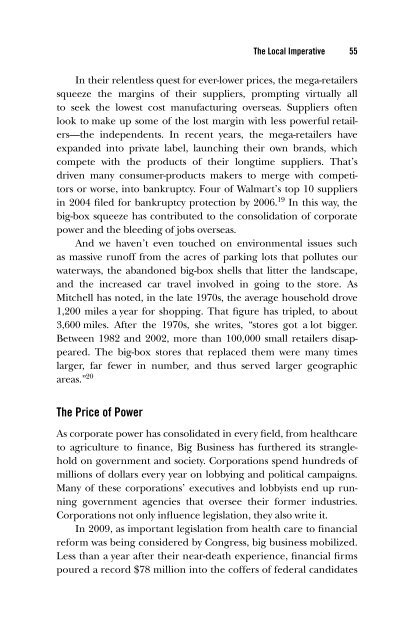3c hapter - Index of
3c hapter - Index of
3c hapter - Index of
You also want an ePaper? Increase the reach of your titles
YUMPU automatically turns print PDFs into web optimized ePapers that Google loves.
The Local Imperative 55<br />
In their relentless quest for ever- lower prices, the mega- retailers<br />
squeeze the margins <strong>of</strong> their suppliers, prompting virtually all<br />
to seek the lowest cost manufacturing overseas. Suppliers <strong>of</strong>ten<br />
look to make up some <strong>of</strong> the lost margin with less powerful retailers—the<br />
independents. In recent years, the mega- retailers have<br />
expanded into private label, launching their own brands, which<br />
compete with the products <strong>of</strong> their longtime suppliers. That’s<br />
driven many consumer- products makers to merge with competitors<br />
or worse, into bankruptcy. Four <strong>of</strong> Walmart’s top 10 suppliers<br />
in 2004 fi led for bankruptcy protection by 2006. 19 In this way, the<br />
big- box squeeze has contributed to the consolidation <strong>of</strong> corporate<br />
power and the bleeding <strong>of</strong> jobs overseas.<br />
And we haven’t even touched on environmental issues such<br />
as massive run<strong>of</strong>f from the acres <strong>of</strong> parking lots that pollutes our<br />
waterways, the abandoned big-box shells that litter the landscape,<br />
and the increased car travel involved in going to the store. As<br />
Mitchell has noted, in the late 1970s, the average household drove<br />
1,200 miles a year for shopping. That fi gure has tripled, to about<br />
3,600 miles. After the 1970s, she writes, “stores got a lot bigger.<br />
Between 1982 and 2002, more than 100,000 small retailers disappeared.<br />
The big- box stores that replaced them were many times<br />
larger, far fewer in number, and thus served larger geographic<br />
areas.” 20<br />
The Price <strong>of</strong> Power<br />
As corporate power has consolidated in every fi eld, from healthcare<br />
to agriculture to fi nance, Big Business has furthered its stranglehold<br />
on government and society. Corporations spend hundreds <strong>of</strong><br />
millions <strong>of</strong> dollars every year on lobbying and political campaigns.<br />
Many <strong>of</strong> these corporations’ executives and lobbyists end up running<br />
government agencies that oversee their former industries.<br />
Corporations not only infl uence legislation, they also write it.<br />
In 2009, as important legislation from health care to fi nancial<br />
reform was being considered by Congress, big business mobilized.<br />
Less than a year after their near- death experience, fi nancial fi rms<br />
poured a record $78 million into the c<strong>of</strong>fers <strong>of</strong> federal candidates
















